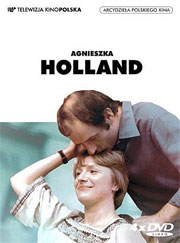 I meant to review the four titles in Telewizja Kinopolska’s DVD box set of Agnieszka Holland’s first four films (one’s a collaborative exercise) in more detail, but it’s so long since I watched them that I’m in danger of forgetting salient bits. So here’s a quick précis:
I meant to review the four titles in Telewizja Kinopolska’s DVD box set of Agnieszka Holland’s first four films (one’s a collaborative exercise) in more detail, but it’s so long since I watched them that I’m in danger of forgetting salient bits. So here’s a quick précis:
Screen Tests (Zdjęcia próbne, 1977): a three-part portmanteau film (co-directed with Jerzy Domaradski and Paweł Kędzierski), whose first two parts focus on each of two aspiring actors (female and male) before bringing them together in (initially) an intimate hotel-room encounter and (eventually) replaying the same thing for the cameras, much to his discomfiture. Lots of well-observed incidents (the scene in which Anya loses her virginity and is almost immediately betrayed by her supposed lover is particularly effective), but it felt more like an exercise (or screen test?) than a fully achieved feature.
Provincial Actors (Aktorzy prowincjonalni, 1978): a Polish viewer well versed in the country’s late 1970s history will doubtless pick up far more nuances, but I suspect I’m right in interpreting this as an impassioned attack on the way culture becomes a political tool, to be interfered with by bureaucrats from the director of a provincial theatre right up to the Ministry of Culture. It’s also a study of an estranged couple on the verge of a permanent split – he’s worrying more about his career than about his wife, who in turn is actively contemplating killing at least one of them. Very strong performances (especially from Halina Labonarska and Tadeusz Huk, both previously unknown to me), and a deliciously slimy cameo from the great Jerzy Stuhr as a theatre critic on whose verdict everything hangs.
Fever (Gorączka, 1981): the set’s only period drama, a study of political passion and futility set in 1905, when Poland didn’t officially exist and a handful of socialist-cum-anarchists devise various means of making an impact, only to find the authorities running rings round them (again, I’m sure there are plenty of allegorical parallels to be drawn, since the film came out in a year that saw the rise of Solidarity and the imposition of martial law – Holland couldn’t have predicted the second, but would certainly know all about the first). The central “protagonist” is in fact a bomb, passed from hand to hand and used in various failed assassination schemes. Some swotting-up on the period would probably help the non-Polish viewer – I got lost in the political machinations very early on, though individual set-pieces were very effective.
A Woman Alone (Kobieta samotna, 1981): well, Agnieszka Holland has the dubious distinction of being heavily involved in what are easily the two most wrist-slittingly depressing Polish films of the early 1980s, the other being Ryszard Bugajski’s Interrogation (Przesłuchanie, 1982), in which she acted. Both were banned, and few can have been surprised: A Woman Alone is one of the sourest, most cynical and despairing studies of the life of ordinary people (a middle-aged single mother, a disabled ex-miner) in a Communist society that I’ve ever seen. Presumably emboldened by the rise of Solidarity (namechecked at least once), Holland doesn’t pull any punches: she graphically shows how a system of collective responsibility ends up utterly marginalising those perceived as “outsiders”, leaving them with literally nowhere to go. Maria Chwalibóg is astonishingly good as Irina, the downtrodden protagonist – she’s not an especially sympathetic character, and much of what happens to her is her own fault, but it’s hard to blame her under the circumstances, and it does at least mean that Holland avoids the trap so many other filmmakers fall into of presenting a saintly individual trampled by fate.
Transfers are basic but acceptable – sourced from reasonably well preserved (but clearly unrestored) theatrical prints, they’re presented in 4:3 (which I think is the original aspect ratio) and aside from a few visual blemishes (nothing serious) they’re very watchable, and there’s no great distinction between any of them in terms of overall quality. They’re definitely a huge improvement on the same label’s Jerzy Skolimowski transfers, though the fact that the films are a fair bit younger probably helped.
One slight niggle is that the print of Fever has burned-in Polish subtitles whenever the dialogue shifts to Russian, so to get round this the subtitles on just this DVD are yellow, and cover up the Polish subtitles (albeit not very well, as the latter are significantly larger). Another slightly bigger niggle is that the subtitles are pretty basic – quite a few typos and also, more annoyingly, a lot of incidental stuff is left untranslated, and I don’t know whether it matters. (Given the “write between the lines” nature of Polish cinema at the time, I’m guessing it probably does). That said, I should be grateful for any English subtitles at all (how many UK labels reciprocate by offering Polish ones?), so I can’t complain too much.
I’m sure the booklet’s terrific – with 24 packed pages not including the cover it certainly looks very substantial – but it’s in Polish only.